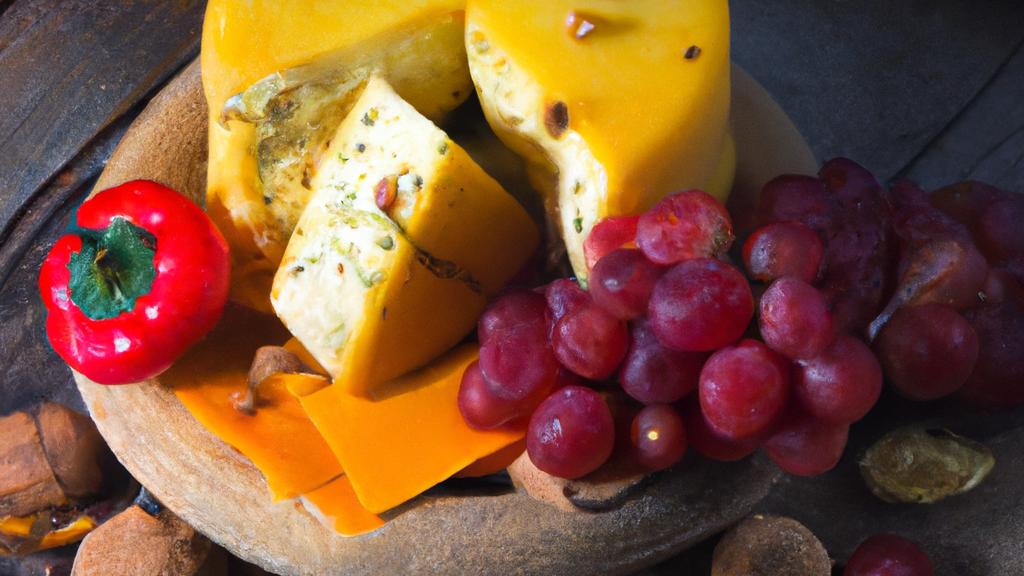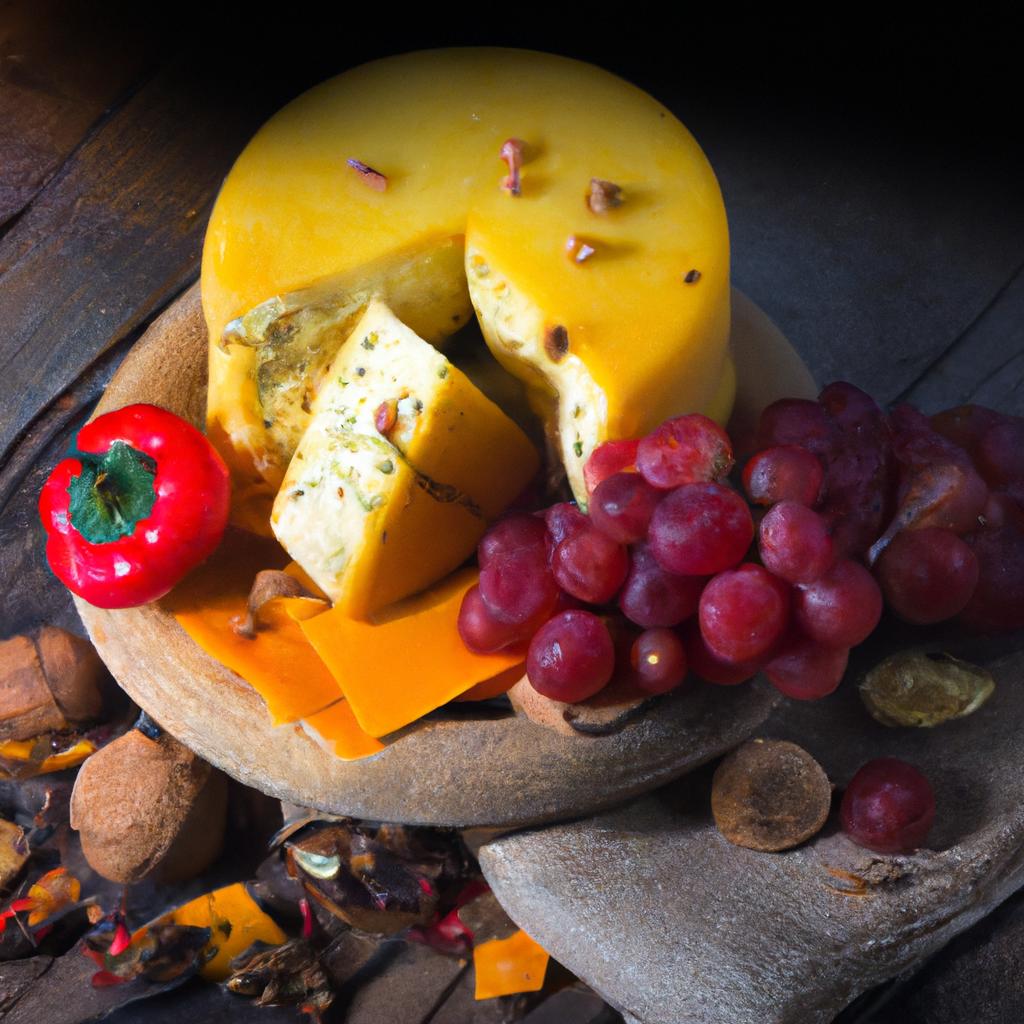
The traditional Bulgarian Razgrad cheese, exclusively produced in the Razgrad region of the country, is an embodiment of the unique cultural legacy and natural elements of this region. Named after its birthplace, Razgrad cheese is meticulously crafted using cow’s milk and a specialized starter culture that ensures its distinct fermentation process, ultimately leading to its recognizable taste and texture. Much like its counterparts worldwide, this cheese reflects the craftsmanship and dedication to traditional dairy practices present in Bulgarian cheesemaking.
Razgrad cheese is characterized by its semi-hard nature, pale yellow color, and slight elasticity. Moreover, it is also identifiable by its mild but slightly tangy taste with a smooth finish. This gastronomical profile ensures Razgrad cheese’s broad compatibility with different culinary applications – from antipasti platters to gourmet recipes, or simply savoured standalone. Appreciation of its fragrance is an integral part of the Razgrad cheese experience, as it manifests a fresh, slightly acidic aroma reminiscent of creamy milk, further enhancing the tasting journey.
It is important to note some distinguished characteristics that make Razgrad cheese stand out amidst the competitive world of cheeses:
- Traditional Manufacturing Process: Razgrad cheese is made using time-tested traditional Bulgarian practices that maintain the authenticity of its flavor and texture. Unpasteurized cow’s milk and native microbial starter culture contribute to its distinctive taste.
- Geographical Indication: The Protected Geographical Indication status of Razgrad cheese safeguards the quality and sustainability of its production. This tag certifies that the cheese is locally produced, processed, and prepared in the Razgrad region, thus preserving its unique properties.
- Nutritional Value: Rich in proteins, calcium and beneficial bacteria like Lactobacillus Bulgaricus, Streptococcus Thermophilus; Razgrad cheese offers both culinary delight and health benefits.
Whether you’re a connoisseur of cheese with a refined palate or an enthusiastic gourmet on the hunt for unique regional cheeses, Razgrad extends an endearing and exciting flavor journey. By stepping into this unique cheese from Bulgaria, one steps into a world that reverberates with the echoes of tradition, refined taste, and the intimate relationship between the land and its people.
Welcome to our quiz on the topic of ‘Razgrad Cheese’! This is your chance to discover how well you grasp the subtleties of this Bulgarian delicacy. Are you ready to test your knowledge and delve into the culinary world of Razgrad Cheese? Embark on your gastronomic journey now!
The Delicate Qualities and Varied Assortment of Razgrad Cheese
Razgrad Cheese, an eminent member of the Balkan cheese family, is renowned for its delicate texture, assorted varieties, and specific composition that sets it apart from its global counterparts. This product is highly esteemed in Bulgaria’s Razgrad region where it originates from, and is regarded as a traditional table staple and culinary gem across the globe. The flavors of Razgrad Cheese may vary depending on the milk used in its production, time of ripening, and the specific hygiene parameters followed at each production stage.
Although the preparation method of ‘white brine cheese’ is similar, the distinctive taste of Razgrad Cheese is owed to the kind of milk used. Traditional Razgrad Cheese is prepared from unprocessed, raw milk obtained from local sheep or cows. This milk is usually unpasteurized and carries with it a unique regional microbial flora which imparts a distinguishing aroma and flavor to the cheese. It possesses a semi-hard texture, is characteristically salty, with variations in moisture content between 45-55% and fat content within dry matter tending to range from 45-60%.
These specifics of Razgrad Cheese find additional variations in its diverse forms. A prominent assortment includes:
- Standard Razgrad Cheese: This variety is produced year-round and is widely consumed due to its delicate taste, creamy texture and moderate salinity.
- Sheep Milk Razgrad Cheese: This variant is made from 100% sheep milk and tends to be richer and slightly sweet, with a distinctive taste derived from sheep milk.
- Seasoned Razgrad Cheese: Aging this cheese with a variety of spices and herbs is a common practice, rendering the cheese a characteristic taste and aroma, such as a hint of oregano, dill or chili pepper.
Beyond the sensory attributes and features of Razgrad Cheese, it is also the process of traditional cheese-making, passed down through generations and the use of local artistic techniques on dairy farms that lend this Bulgarian cheese its authenticity. Comprehension and knowledge of the uniqueness and the implications of these details can guide cheese enthusiasts in making an informed choice to truly savor this culinary delicacy.
Razgrad Cheese: Exploring the Unique Cheese from Bulgaria
Bulgaria, a country rich in cultural heritage and stunning landscapes, is also known for its exceptional cheese production. Among the many delightful cheese varieties originating from Bulgaria, Razgrad Cheese stands out as a unique product embedded with tradition and flavor.
Razgrad Cheese hails from the northeastern region of Bulgaria, specifically the town of Razgrad, which is famous for its long-standing cheese-making traditions. This cheese has gained recognition not only locally but also internationally, captivating cheese enthusiasts with its distinct characteristics.
What sets Razgrad Cheese apart is the combination of its outstanding taste and meticulous production process. Made from high-quality cow’s milk, this semi-hard cheese undergoes a careful aging process, ensuring its rich and complex flavor profile. The cheese’s texture is smooth and slightly elastic, making it perfect for slicing or crumbling onto various dishes.
The Characteristics of Razgrad Cheese
Razgrad Cheese boasts a range of distinctive characteristics that contribute to its popularity among cheese connoisseurs:
- Flavor: The cheese offers a harmonious blend of mild and savory notes, with a gentle tang and a subtle hint of sweetness that lingers on the palate.
- Aroma: Its aroma is pleasingly fragrant, with delicate hints of butter and dairy richness.
- Texture: The texture of Razgrad Cheese is semi-hard, with a smooth and slightly elastic consistency that provides a delightful mouthfeel.
- Color: The cheese has an ivory-yellow hue, creating an appealing visual contrast on cheese platters or in various culinary creations.
Razgrad Cheese is versatile in its usage, equally delicious enjoyed on its own or incorporated into a wide array of dishes. Its melting capabilities make it an ideal choice for grilled cheese sandwiches, pasta dishes, or even a traditional Bulgarian banitsa pie.
When it comes to exploring the world of cheese, Razgrad Cheese offers an opportunity to discover the exceptional flavors that Bulgaria has to offer. Its unique characteristics and the passion behind its production make it a true gem among the vast landscape of cheese varieties.
- Bulgaria produces over 70 varieties of cheese.
- Razgrad is one of the cheese-producing regions in Bulgaria.
- Cheese consumption in Bulgaria is estimated to be around 18.8 kg per capita.
- Bulgaria ranks 16th globally in cheese production.
- Razgrad Cheese is widely renowned for its distinct tangy flavour.
- There are many small-scale dairies in Razgrad region involved in cheese production.
- Bulgaria has a rich dairy tradition, with cheese being an essential part of its cuisine.
Razgrad Cheese: Culinary Experiments for Cheese Connoisseurs
Renowned for its strong and distinct flavor, Razgrad cheese from Bulgaria is a remarkable ingredient to work with in various culinary endeavours. Its rich history, dating back to the Thracians who originally inhabited the region, gives it a taste and, therefore, dining appeal that few other cheese variants can match. Coming from the town of Razgrad, which lies in the northeastern part of the country, this captivating, firm cheese has its unique characteristics derived from the temperate climate, quality of local milk, and traditional production techniques.
Razgrad cheese offers a unique robustness which makes it an adventurous inclusion in any gourmet’ dish. Here are two recipes that will let you experience the intricate flavor profile of Razgrad cheese.
1. Razgrad Cheese Stuffed Peppers
A classic Bulgarian staple, this recipe allows the tangy profile of Razgrad cheese to shine through.
- Preheat your oven to 200°C.
- Take four large bell peppers, halve them and discard the seeds and membranes.
- In a bowl, combine 200 grams of grated Razgrad cheese, a cup of cooked quinoa, a handful of chopped fresh dill, and some salt and pepper to taste.
- Heap the filling into each pepper half, drizzle with olive oil, and bake for about 20-25 minutes or until the peppers are tender and the cheese has melted.
The result is a hearty, healthful dish filled with the robust taste of Razgrad – a true delight for your taste buds.
2. Razgrad Cheese and Walnut Pesto Pasta
If you’re up for a hearty, comfort food, try this pasta dish that pairs the bold Razgrad cheese with the pleasing crunch of walnuts.
- Start by boiling your pasta of choice until al dente.
- In the meantime, in a food processor, combine a cup of walnuts, two garlic cloves, and a cup of Razgrad cheese. Drizzle in olive oil as the machine is running until a thick paste forms.
- Season the pesto with salt and pepper to taste, and then toss with the hot pasta until well coated.
It’s all the comfort you could possibly ask for in a bowl, packed with the flavorful kick of Razgrad cheese.
Both these dishes greatly highlight the versatility of Razgrad cheese, proving it as a gourmet ingredient able to transform simple recipes into culinary masterpieces. Give it a try and experience a piece of Bulgaria’s rich gastronomic heritage.
Razgrad Cheese: Ideal Wine Pairings and Culinary Complementaries
Razgrad cheese, a Bulgarian gem renowned for its delicate balance of saltiness and smooth texture, sparks a delightful dialogue with certain wines and culinary options. This methodic form of culinary matchmaking roots deeply in its unique flavor profile, that steers the dodge between sharp and creamy subtleties, making it both versatile and particularly distinctive to pair.
A common avenue for cheese enthusiasts when pairing wines with Razgrad is to explore the complementary charms of white wines. The high acidity and delicate fruitiness of a classic Sauvignon Blanc, for instance, interacts superbly with Razgrad cheese, cleansing the palate and highlighting the cheese’s unique flavor spectrum. Alternatively, a dry riesling can, too, weave a beautiful narrative with Razgrad cheese. Its innate minerality subtly elevates the cheese’s natural earthiness, further enriching the gastronomic experience.
Razgrad cheese, with its rich tradition and distinct flavour notes, also pairs delightfully with various dishes. Here are some of those that particularly enlighten the cheese’s character:
- Grilled Vegetable Medley: Razgrad cheese’s creaminess harmonizes perfectly with the smoky undertones of grilled vegetables, creating a savory symphony on the bite.
- Seafood Pasta: This Bulgarian cheese could add a refined touch to a hearty seafood pasta dish, concurrently amplifying the freshness of the food and infusing an unexpected depth of flavor.
- Artisanal Breads and Charcuterie: For a simpler approach, Razgrad cheese can be enjoyed with crusty artisanal breads and an assorted charcuterie plate. The cheese’s texture and mild saltiness are a fascinating complement to the crunchy breads and the savory, spiced cold cuts.
Though pairing Razgrad cheese is always subject to personal preference, the potential of experiencing this cheese in different culinary contexts is truly vast. Subtle yet distinctive, Razgrad forms an integral piece of global gastronomic heritage, continuously encouraging food enthusiasts to dive deeper into the world of cheese. The above pairings thus reflect both a tribute to this heritage and an invite for further exploration, creating a harmonious blend of traditional, innovative, and gastronomically delightful endeavors.
Exploring Similar Cheeses to Razgrad Cheese
Razgrad Cheese is a unique Bulgarian cheese known for its rich flavor and creamy texture. If you are a fan of this cheese and want to explore other varieties that share similar characteristics, then you are in for a treat. Here are some exceptional cheeses that can provide a comparable taste experience to Razgrad Cheese:
- Kashkaval Cheese: Hailing from the Balkan region, Kashkaval is a semi-hard cheese made from cow’s milk. It is renowned for its smooth and elastic texture, and its slightly salty and nutty flavors. Kashkaval cheese is often used as a melting cheese or enjoyed with crusty bread and a glass of wine.
- Feta Cheese: Originating from Greece, Feta is a brined cheese made from sheep’s milk or a blend of sheep’s and goat’s milk. It has a crumbly texture and a tangy and salty taste. Feta is commonly used in salads, as a table cheese, or in various Greek dishes like spanakopita and moussaka.
- Paneer Cheese: A popular cheese in Indian cuisine, Paneer is a fresh cheese made from cow’s milk. It is mild and creamy with a slightly acidic taste. Paneer cheese is firm enough to be grilled or fried, making it a versatile ingredient in many vegetarian dishes.
- Halloumi Cheese: Originating from Cyprus, Halloumi is a semi-hard, brined cheese made from sheep’s, goat’s, or a blend of both milks. It has a unique texture, being semi-soft yet very firm, and a salty and tangy flavor. Halloumi cheese can be pan-fried or grilled without melting, making it a great addition to salads, sandwiches, or eaten on its own.
Whether you enjoy Razgrad Cheese or want to venture into new cheese territory, these similar cheeses offer distinctive flavors and textures that are sure to tantalize your taste buds. Give them a try and experience the diverse world of cheese.


